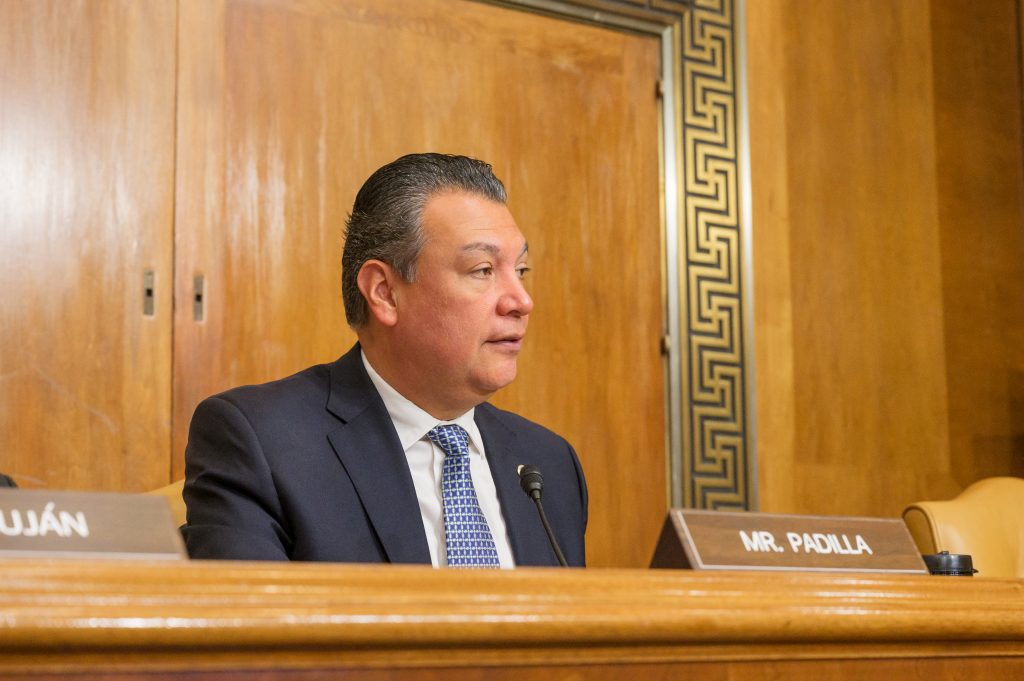- March 8, 2023
Padilla Questions Expert Witness on the Need for More Federal Investment in Wildfire Preparedness
“Padilla: California’s worst wildfire year on record will pale in comparison to the wildfires of 2030 or 2040 unless we change our practices.”

WASHINGTON, D.C. — Today, U.S. Senator Alex Padilla (D-Calif.) participated in a Senate Budget Committee hearing to examine the costs of wildfires and emphasize the need for increased federal investment to better protect state, local, and Tribal communities, the environment, and critical infrastructure from the impacts of wildfires. During the hearing titled “A Burning Issue: The Economic Costs of Wildfires,” Padilla introduced and questioned California native Dr. Michael Wara, Director of the Climate and Energy Policy Program and Senior Research Scholar at the Stanford Woods Institute for the Environment.
WATCH: View Video of Padilla Introducing Dr. Michael Wara
During his questioning, Padilla highlighted the increasing threat of wildfires and asked Dr. Wara to explain how federal investment in wildfire mitigation efforts significantly reduces costs for the federal government compared to post-wildfire recovery efforts. Dr. Wara lauded the investments that were made in the last congress to mitigate the threat of wildfires and explained that while these investments were critical to protecting families and communities across the West, more must be done. Padilla and Wara then discussed the importance of federal investments in forest management and how increased management would reduce emissions and promote fire resiliency. Dr. Wara reiterated that fuels reduction and management can help keep our forests intact and noted that the consequences of poor forest management were increased forest destruction and worsening of the climate crisis.
WATCH: View Video of Padilla Questioning Dr. Michael Wara
Key Excerpts:
- PADILLA: the reality is that the wildfires of 2020 which, Mr. Chairman you referenced in your opening, California’s worst wildfire year on record, will pale in comparison to the wildfires of 2030 or 2040. Unless we change our practices. […] Dr. Wara, many members of this committee, and the Senate as a whole, are quick to share their concerns about federal spending levels, or they consider return on investments in making their decisions or cost benefit analysis. Can you explain why mitigation funding represents the best bang for the buck for the American taxpayer?
- WARA: I think there’s a clear path forward for actually saving money for the federal government, substantial sums of money, in terms of its management of federal lands if we can shift the balance towards mitigation and away from the kind of runaway freight train spending on wildfire suppression. Doing that is going to require just what you said Senator Padilla, recognizing that the historic investments that you have made over the past year in wildfire are a down payment. But that we need to get into a situation where we’re actually paying the mortgage for the true costs of wildfire in the West.
- PADILLA: In California forests make up 1/3 of the state’s total land area. However, due to the catastrophic wildfires and drought induced tree mortality, California’s forests have unfortunately stopped regulating emissions and instead have begun contributing to them. Dr. Wara, could you speak to the importance of federal investments in forest management, in particular, specifically for mature and old growth forests and how these investments could also reduce emissions and promote resiliency?
- WARA: What fuels management can do is return the forest to something like its natural state where there’s greater spacing between trees. And that means the trees are much more likely to survive drought, they’re much more resistant to beetle kill, and when a fire passes through, it’s much less likely to kill the entire forest. So, there are big returns because we keep the forest intact.
Since taking office, Padilla has made improving the federal response to wildfires one of his top priorities. Last year, President Biden signed Padilla’s FIRE Act into law, the legislation will strengthen FEMA’s wildfire preparedness and response efforts. Padilla also introduced a package of bills aimed at ensuring California has the federal resources it needs to protect communities impacted by wildfire smoke and is leading legislation aimed at battling wildfires, protecting workers, and helping combat the effects of wildfire smoke. He also successfully advocated for California to receive billions for wildfire response and drought relief in the Bipartisan Infrastructure Law. Padilla’s Fire Suppression Improvement Act, a bill to help ease the burden on state and local governments who are shouldering the weight of responding to increasingly devastating wildfires was also unanimously advanced out of the Senate Homeland Security and Governmental Affairs Committee.
###